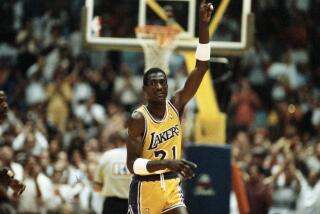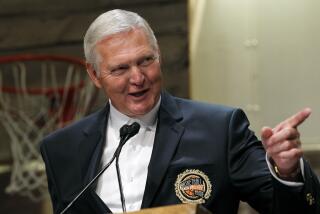In L.A., He Did What It Took
- Share via
Jerry West, his eyes red and moist Tuesday, remembered Wilt Chamberlain as a friend and former teammate who was a gentle giant, despite his enormous size and outsized personality.
“He had this bluster about him,” West said during a hastily arranged news conference at the Great Western Forum, “but on the inside he was a soft guy . . . and he was really perplexed that people would get on him and boo him. He couldn’t figure that out, because he thought he was a good guy.”
West thought so too.
“I got to know [him] as a player at a point in my career when I was really doubting whether or not we could win a championship [and] he helped reinvigorate me personally,” West said only a few hours after learning that Chamberlain’s body had been found in his Bel Air home. “This is really a sad day for me personally.”
West and the Lakers, lacking a great center to combat Bill Russell of the Boston Celtics, had made five fruitless trips to the NBA finals before Chamberlain was acquired in a blockbuster trade with the Philadelphia 76ers before the 1968-69 season.
Still, it was speculated that West didn’t welcome Chamberlain.
“When we got him, I read a newspaper article that Jerry West didn’t want him here,” West said. “That’s the most ridiculous thing I’ve ever read in my life because we needed a center. . . .
“And I think his ability to come into a situation and look at the people we had on this team and decide, ‘I’m not going to score as much anymore, I’m going to try to do the other things that make us a better team’--that was the thing that maybe surprised me a little bit because all you hear is, ‘he just wants to score points.’ That really wasn’t the case here. He was fun. . . . He was a common man’s star.”
Still, the Lakers made two more losing trips to the finals before finally breaking through in their record-breaking 1971-72 season, when they won a record 33 consecutive games and claimed the NBA title for the first time since their move from Minneapolis in 1960.
West said it was a simple gesture by Bill Sharman, the Lakers’ first-year coach, that provided the spark that ignited the title run: He made Chamberlain the captain.
“I really felt that small thing played a significant role for him, trying to be a team leader,” West said. “It’s hard for guys that big to be team leaders. And the other players rallied around him.
“When he was playing, we were invincible. When he was playing his best, no one could beat us.”
Sharman said coaching Chamberlain was a dream.
“Wilt had this reputation of being difficult, but in the two years I coached him, we never had one blowout or misunderstanding,” he said. “What impressed me most was that he was willing to sacrifice his own abilities for the good of the team.
“We had a lot of scorers on that team--West, [Gail] Goodrich, Jim McMillian, Pat Riley, Keith Erickson. I told Wilt what we needed from him was defense and rebounding, and that’s what he gave us.”
Elgin Baylor retired early in the season, leaving the NBA without a championship ring, despite a brilliant career played alongside West.
“At the time the trade was made, it was at the tail end of my career,” Baylor, the vice president of basketball operations for the Clippers, said Tuesday of the deal that brought Chamberlain to Los Angeles. “I had had injuries and everything else, but I said, ‘This is great. Now, we can probably win championships.’
“I’ve always felt that if we could have been together during the prime of my career, we would have won many championships.”
But Chamberlain, despite his many individual accomplishments, won only two NBA titles.
“For all players, we’re really judged by how many championships we won,” West said. “Unfortunately for him, he only won two. But his greatness as a player, in my mind--and most basketball people’s minds--could never be questioned. . . .
“He always felt he didn’t get the credit he was due, but I think all of us who knew him and played against him realize the enormous impact he had, not only with his teammates but on the state of basketball. . . .
“He was one of those fabulous players who kind of define sports.”
*
Times staff writers Larry Stewart and Lonnie White contributed to this article.
More to Read
All things Lakers, all the time.
Get all the Lakers news you need in Dan Woike's weekly newsletter.
You may occasionally receive promotional content from the Los Angeles Times.






